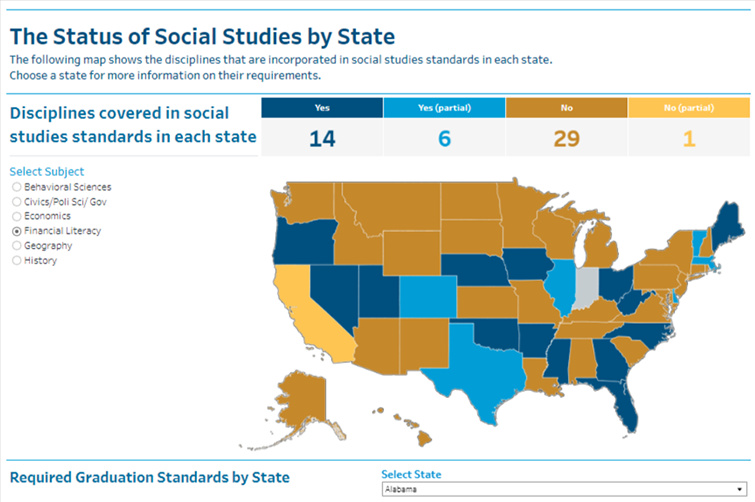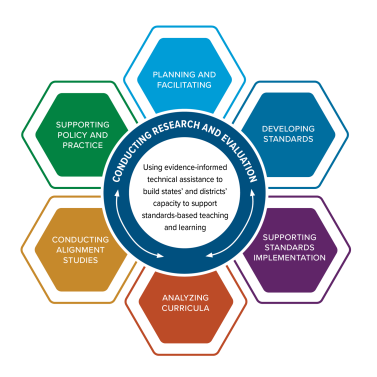Standards and Assessments in Social Studies

Since 2012, AIR has intentionally grown a strong portfolio of social studies education projects. For example, AIR has supported more than 12 states, various U.S. territories, and 4 national organizations in the planning, revision, and implementation of social studies standards. High-quality standards are the foundation of a strong education system and inform cohesive policy decisions that support equitable teaching and learning outcomes for all students. They provide a common foundation and language across districts in a state and allow each district or school to build its own curriculum based on the standards. AIR’s approach to Standards and Assessments provides a cohesive and comprehensive structure to guide the development of standards-based systems.
Developing social studies standards and assessments can be particularly challenging given the broad array of disciplines the subject covers, including history, civics, geography, economics, and financial literacy. AIR is here to provide support and guidance throughout this process to ensure high-quality products and results.
for more information about how we support states and schools to develop high-quality standards and assessments
Social Studies Standards Map
Explore this interactive U.S. map that AIR developed to show the disciplines that social studies standards cover in each state.

Report: The State of K-12 Social Studies Education

Research consistently indicates that social studies educators receive less instructional time, professional development, and learning resources in comparison to other subjects. In our report, we draw from our experience working with states, districts, and social studies organizations to identify key trends in social studies education and explore current gaps and opportunities to bring greater focus to what is needed in the field. We communicate the state of K-12 social studies education by examining the following topics:
- Trends in the development and content of state social studies standards;
- Landscape of curriculum materials and state and district efforts in evaluating these materials; and
- Gaps in the field for further investigation.
Project Highlights

AIR’s Standards and Assessment ecosystem provides a cohesive and comprehensive structure to guide the development of social studies standards-aligned systems.
Explore our project highlights below for examples of each of the elements of our ecosystem.
When a new statute called for the Kentucky Department of Education to revise its current social studies standards and focus on helping more students become civically informed, Department leadership needed an experienced facilitation partner...
AIR stepped into this role, collaborating with key leaders across the state to review current policies and processes, develop more inclusive feedback loops, and co-construct a clear process for revising the standards.
AIR’s work has helped ensure that Kentucky’s new social studies standards reflect a diverse range of voices, perspectives, and evidence-based practices.
To help students prepare for college, become engaged citizens, and enter their chosen career fields, the Hawaii State Board of Education voted to adopt the College, Career, and Civic Life Framework (C3) in 2015. Using the C3 Framework, Hawaii’s Department of Education (HIDOE) collaborated with AIR to begin the process of revising its social studies standards...
Working in partnership with the Region 19 Comprehensive Center, HIDOE, and the Hawaii Social Studies Consultant, AIR helped produce processes, tools, and resources for the complicated revision process. These evidence-informed resources included protocols and rubrics to identify the writing team, frame the revision process, and integrate the C3 Framework into standards creation.
AIR experts provided on-site and virtual coaching and consultation for Department staff and teams of social studies educators, including representatives from higher education, cultural elders, and community content specialists. Teams also reviewed evidence-based and promising practices, shared templates and exemplars, and created supports for stakeholder engagement and feedback.
Finally, AIR worked with a team of educators to build out a comprehensive implementation map and develop online professional development modules to support the first three years of implementation.
In 2021, the New Mexico Department of Education (NMPED) updated its social studies standards, which were last revised a decade ago. NMPED’s comprehensive plan included working with AIR to infuse research, data, and evidence into the standards development process in a way that prioritized diversity and created a culturally responsive approach to teaching social studies...
The new standards focus on building knowledge, skills, and practices that ensure all students across New Mexico are college and career ready. After facilitating the development of the new social studies standards, AIR supported NMPED’s standards implementation plan by developing 12 online professional development modules and several parent guides.
This partnership has provided educators with the research-informed resources necessary to successfully implement the new standards during the 2023–24 school year.
In 2022, Louisiana adopted new social studies standards focused on better reflecting diverse perspectives, among other priorities. To help implement the new standards, the Louisiana Department of Education (LDOE) partnered with AIR and EdReports, an independent nonprofit organization designed to improve K–12 education...
LDOE began working with EdReports to create a process for developing a high-quality instructional materials (HQIM) rubric and evidence for social studies. EdReports contacted AIR for social studies expertise to support the process. During phase 1 of this work, EdReports and AIR created a social studies review tool, evidence guides, and training materials to support educators’ implementation of the new standards. AIR developed a national landscape report during phase 2 of this work, which outlined the need for HQIM in social studies education.
Grounded in research and instructional best practices, this report also incorporates feedback from educator focus groups and an analysis of states’ social studies review tools to evaluate HQIM.
In 2014, DoDEA began planning its standards-revision process in four content areas: mathematics, English language arts, science, and social studies. A key part of that process was working with AIR to better align the current standards with the latest national trends...
As one of two federally operated school systems, the Department of Defense Education Activity (DoDEA) is responsible for planning, directing, coordinating, and managing educational programs for grades preK–12 on behalf of the U.S. Department of Defense. DoDEA operates 160 accredited schools across 11 countries, 7 states, Guam, and Puerto Rico. It employs approximately 15,000 employees and educators who serve more than 69,688 children of active-duty military and civilian families.
The DoDEA's work with AIR included conducting an in-depth analysis of several different frameworks, including the DoDEA and Common Core State Standards for mathematics and English language arts; the DoDEA science standards; the Next Generation Science Standards; the DoDEA social studies standards; and the College, Career, and Civic Life (C3) Framework for Social Studies.
As part of this work, AIR and its partners designed an alignment protocol and process, developed final reports, and created a transition map for implementing each set of standards.
In 2016, the Nebraska Department of Education (NDE) developed comprehensive plans to implement its academic standards. NDE initiated these plans collaboratively with the Region 11 Comprehensive Center (R11CC)...
Operated by McREL International, R11CC is one of 19 regional centers across the nation that help state education agencies implement, scale, and sustain evidence-based programs, practices, and interventions that support improved educator and student outcomes. AIR worked with NDE and the R11CC to design a comprehensive plan for implementing academic standards across content areas.
For this work, AIR brought together a diverse cross section of key stakeholders from across Nebraska and facilitated the development of an implementation map—a research-informed process that involves working with collaborators to outline the drivers of standards implementation. The map is used across the education system to create effective tools to support policy decisions that put standards into practice.


